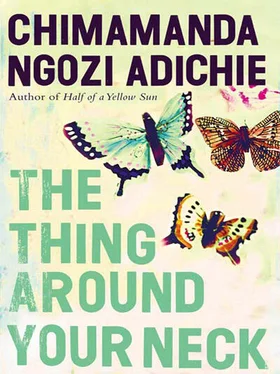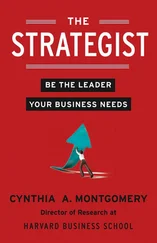“But why do we say nothing?” Ujunwa asked. She raised her voice and looked at the others. “Why do we always say nothing?”
They looked at one another. The Kenyan told the waiter that the water was getting warm and could he please get some more ice. The Tanzanian asked the waiter where in Malawi he was from. The Kenyan asked him if the cooks, too, were from Malawi as all the waiters seemed to be. Then the Zimbabwean said she did not care where the cooks were from because the food at Jumping Monkey Hill was simply sickening, all that meat and cream. Other words tumbled out and Ujunwa was not sure who said what. Imagine an African gathering with no rice and why should beer be banned at the dinner table just because Edward thought wine was proper and breakfast at eight was too early, never mind that Edward said it was the “right” time and the smell of his pipe was nauseating and he had to decide which he liked to smoke, anyway, and stop rolling cigarettes halfway through a pipe.
Only the black South African remained silent. He looked bereft, hands clasped in his lap, before he said that Edward was just an old man who meant no harm. Ujunwa shouted at him, “This kind of attitude is why they could kill you and herd you into townships and require passes from you before you could walk on your own land!” Then she stopped herself and apologized. She should not have said that. She had not meant to raise her voice. The Black South African shrugged, as if he understood that the devil would always do his work. The Kenyan was watching Ujunwa. He told her, in a low voice, that she was angry about more than just Edward and she looked away and wondered if “angry” was the right word.
Later, she went to the souvenir shop with the Kenyan and the Senegalese and the Tanzanian and tried on jewelry made of faux ivory. They teased the Tanzanian about his interest in jewelry — perhaps he was gay, too? He laughed and said his possibilities were limitless. Then he said, more seriously, that Edward was connected and could find them a London agent; there was no need to antagonize the man, no need to close doors to opportunity. He, for one, didn’t want to end up at that dull teaching job in Arusha. He was speaking as though to everyone, but his eyes were on Ujunwa.
Ujunwa bought a necklace and put it on and liked the look of the white, tooth-shaped pendant against her throat. That evening Isabel smiled when she saw it. “I wish people would see how faux ivory looks real and leave the animals alone,” she said. Ujunwa beamed and said that it was in fact real ivory and wondered whether to add that she had killed the elephant herself during a royal hunt. Isabel looked startled, then pained. Ujunwa fingered the plastic. She needed to be relaxed, and she said this to herself over and over, as she started to read from her story. Afterwards, the Ugandan spoke first, saying how strong a story it was, how believable, his confident tone surprising Ujunwa even more than his words. The Tanzanian said she captured Lagos well, the smells and sounds, and it was incredible how similar Third World cities were. The white South African said she hated that term, Third World, but had loved the realistic portrayal of what women were going through in Nigeria. Edward leaned back and said, “It’s never quite like that in real life, is it? Women are never victims in that sort of crude way and certainly not in Nigeria. Nigeria has women in high positions. The most powerful cabinet minister today is a woman.”
The Kenyan cut in and said he liked the story but didn’t believe Chioma would give up the job; she was, after all, a woman with no other choices, and so he thought the ending was implausible.
“The whole thing is implausible,” Edward said. “This is agenda writing, it isn’t a real story of real people.”
Inside Ujunwa, something shrank. Edward was still speaking. Of course one had to admire the writing itself, which was quite mah -ve-lous. He was watching her, and it was the victory in his eyes that made her stand up and start to laugh. The participants stared at her. She laughed and laughed and they watched her and then she picked up her papers. “A real story of real people?” she said, with her eyes on Edward’s face. “The only thing I didn’t add in the story is that after I left my coworker and walked out of the alhaji’s house, I got into the Jeep and insisted that the driver take me home because I knew it was the last time I would be riding in it.”
There were other things Ujunwa wanted to say, but she did not say them. There were tears crowding up in her eyes but she did not let them out. She was looking forward to calling her mother, and as she walked back to her cabin, she wondered whether this ending, in a story, would be considered plausible.
The Thing Around Your Neck
You thought everybody in America had a car and a gun; your uncles and aunts and cousins thought so, too. Right after you won the American visa lottery, they told you: In a month, you will have a big car. Soon, a big house. But don’t buy a gun like those Americans.
They trooped into the room in Lagos where you lived with your father and mother and three siblings, leaning against the unpainted walls because there weren’t enough chairs to go round, to say goodbye in loud voices and tell you with lowered voices what they wanted you to send them. In comparison to the big car and house (and possibly gun), the things they wanted were minor — handbags and shoes and perfumes and clothes. You said okay, no problem.
Your uncle in America, who had put in the names of all your family members for the American visa lottery, said you could live with him until you got on your feet. He picked you up at the airport and bought you a big hot dog with yellow mustard that nauseated you. Introduction to America, he said with a laugh. He lived in a small white town in Maine, in a thirty-year-old house by a lake. He told you that the company he worked for had offered him a few thousand more than the average salary plus stock options because they were desperately trying to look diverse. They included a photo of him in every brochure, even those that had nothing to do with his unit. He laughed and said the job was good, was worth living in an all-white town even though his wife had to drive an hour to find a hair salon that did black hair. The trick was to understand America, to know that America was give-and-take. You gave up a lot but you gained a lot, too.
He showed you how to apply for a cashier job in the gas station on Main Street and he enrolled you in a community college, where the girls had thick thighs and wore bright-red nail polish, and self-tanner that made them look orange. They asked where you learned to speak English and if you had real houses back in Africa and if you’d seen a car before you came to America. They gawped at your hair. Does it stand up or fall down when you take out the braids? They wanted to know. All of it stands up? How? Why? Do you use a comb? You smiled tightly when they asked those questions. Your uncle told you to expect it; a mixture of ignorance and arrogance, he called it. Then he told you how the neighbors said, a few months after he moved into his house, that the squirrels had started to disappear. They had heard that Africans ate all kinds of wild animals.
You laughed with your uncle and you felt at home in his house; his wife called you nwanne, sister, and his two school-age children called you Aunty. They spoke Igbo and ate garri for lunch and it was like home. Until your uncle came into the cramped basement where you slept with old boxes and cartons and pulled you forcefully to him, squeezing your buttocks, moaning. He wasn’t really your uncle; he was actually a brother of your father’s sister’s husband, not related by blood. After you pushed him away, he sat on your bed — it was his house, after all — and smiled and said you were no longer a child at twenty-two. If you let him, he would do many things for you. Smart women did it all the time. How did you think those women back home in Lagos with well-paying jobs made it? Even women in New York City?
Читать дальше











